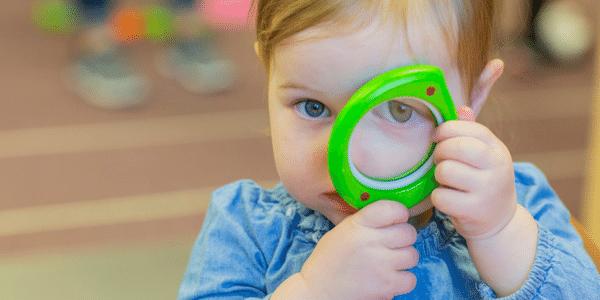Infant & Toddler Self-Control Strategies

Self-Control Strategies for Infants & Toddlers
There are times in everyone’s life when everything seems so out of control. When we enter these seasons, it is natural for us to want to take control of something. Children are no different than adults in this way. Allowing children to feel in control of the things that they CAN control is not only incredibly important for their growth and development, but can also help to ease stress and anxiety. Here are some tips you can use to help the infants and toddlers in your care control what they can control:
- As young as 18 months, if children need to change their clothes because they got wet, have food on them, or became soiled, give them two shirts and two pairs of pants – ask them to choose one thing from each pile. Then let it go. Be okay with what they choose. No matter what.
- Allow children to clean up in the way that they are willing and able to - put toys in a basket or on the shelf but do not hyperfocus on putting them in the “right” place. This skill can come when they are older (3-4 years).
- Offer simple choices as early as possible such as:
- color of cup
- which seat to sit in at the table
- which crayon to use
- Offer a choice through a question,
- “Do you want to walk on your own or do you want me to hold your hand?
- "Do you want to do it by yourself or would you like me to help you?”
Tips on Teaching Infants & Toddlers Accountability
Hold children accountable to the choice they make the first time. No matter what the child chooses, the goal is accomplished. It is natural for them to go back and forth a bit. Allow for this process, but only for a few moments. You can offer to sing a song or count backwards from 5 and when the song is done, or you get to 1 it is time to make a choice.
At this point if the child still cannot choose you can choose for them, you can say “You said you wanted the red cup then you said you wanted the blue cup. You are having trouble deciding, so I am going to help you. I will give you the red cup this time because that is what you asked for first. Next time you can have the blue cup.”
If the child is crying and in distress at this point, limit your words. Simply say, “You are feeling upset. I get upset too when I am having a hard time deciding what I want.” Save the longer conversation for when they are calm and able to process the information.
When we give our children control of small things consistently and encourage them to make choices, we begin the process of teaching them that they have a voice. We are helping them understand that their ideas are important.
By holding children accountable we also teach them to do what they say they are going to do—a skill that will serve them well much later in life.
Keeping Yourself Accountable
Slow yourself down. Ask yourself these questions:
- What moments during the day are you taking control, when your children could have control instead?
- What foundation are you building by doing everything for them without giving them a choice?
- How would you feel if you never had a choice or the ability to control even the smallest things that matter to you?
- Does it really matter if they clean up perfectly?
As care teachers, learning to let go will not only reduce your stress level but it will also increase the feeling of community in your classroom where each child and each adult have a voice and are valued for who they are as well as for the ideas that they bring to the table.
Infants and toddlers are human beings and deserve the experience of having a voice just as much as anyone else.
Try it for 2 weeks - commit to one part of your day to let go. Decide which choices you will give the children and do so consistently. Then look back - how did offering choices change that part of your day? Were there behaviors that have changed because of giving the children choices?
- What moments during the day are you taking control, when your children could have control instead?
 Julie Sizemore is the creator of RESPECT Care Teaching. A wife and mother of two children, she has been in the field of early childhood education since 1999 in many different capacities from home-based childcare, to center based child care, after school programs, home visiting, and a community liaison. Currently, she works full time as a lab instructor at the Phyllis Fratzke Early Childhood Learning Laboratory (ECLL) on campus at Grand Rapids Community College, working in the 0-3 Early Head Start Classroom. In the evening and on weekends, she provides in person and online training focused on infants and toddlers for the early childhood community. Julie is a fierce advocate for treating infants and toddlers with respect and educating people on developmentally appropriate practices.
Julie Sizemore is the creator of RESPECT Care Teaching. A wife and mother of two children, she has been in the field of early childhood education since 1999 in many different capacities from home-based childcare, to center based child care, after school programs, home visiting, and a community liaison. Currently, she works full time as a lab instructor at the Phyllis Fratzke Early Childhood Learning Laboratory (ECLL) on campus at Grand Rapids Community College, working in the 0-3 Early Head Start Classroom. In the evening and on weekends, she provides in person and online training focused on infants and toddlers for the early childhood community. Julie is a fierce advocate for treating infants and toddlers with respect and educating people on developmentally appropriate practices.
